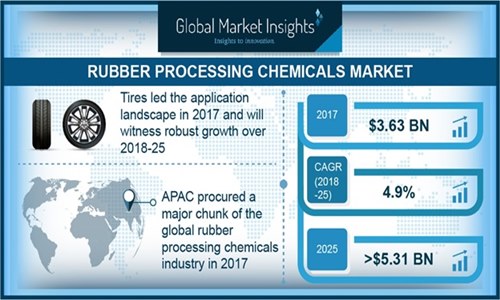Rubber processing chemicals industry to exhibit an accelerated growth rate from tire manufacturing applications to 2025, surging automobile production to fuel the industry landscape
Author : Pankaj Singh | Published Date : 2019-02-26

Owing to the ceaseless demand for automobiles over the past three decades, the global rubber processing chemicals industry has witnessed rapid development, specifically from the tire manufacturing segment. A rather fast moving vertical, tire manufacturing involves continuous utilization of chemicals and additives that help vulcanization of rubber and induce long-lasting properties in a tire. Anti-degradants, in particular, are key chemical ingredients required for ensuring durability and safety of tires throughout their lifecycle. As such, increased demand for automotive tires will boost the production of these chemicals and offer significant growth prospects for the rubber processing chemicals market.
According to a research report by Global Market Insights, Inc., tire manufacturing accounts for nearly 70 percent share of the global rubber processing chemicals industry that held US$3.5 billion in 2017. Renowned tire brands such as Goodyear, Michelin, Continental and Bridgestone have consistently expanded their global operations in anticipation of automobile demand. This has allowed chemical companies to pursue tremendous investments for increasing production capacities as well as for research and development of enhanced accelerators and anti-degradants for the tire segment.
Automobile manufacturing sector driving the rubber processing chemicals market
Reducing cost of materials around the world and cheap labor cost in emerging economies has enabled automakers to produce million of vehicles every year, besides benefiting the auto ancillary and aftermarket businesses. Demand for passenger vehicles has been fueled by rising disposable incomes, while industrialization has led to a higher consumption of trucks and other commercial vehicles. The OICA has revealed that in 2017 itself, more than 97.3 million vehicles were produced globally, which was 2.36 percent rise over the previous year. About 29 million vehicles were manufactured in China itself, where considerable volume of tires are also produced.
Goodyear, which was the first global tire company to enter China, had in 2016 invested in the expansion of its China production facility to meet the growing Asia Pacific market demand. The project is expected to be completed by 2020 and by that time, the plant’s manufacturing capacity would increase by 5 million tires per year. Several companies based in Asia, like Japan’s Bridgestone and Sumitomo Tires, have extended their reach beyond the regional landscape and provided lucrative businesses to chemical companies that support rubber production for tires. Essentially, the production of vehicles is predicted to grow year on year due to evolving consumer trends, snowballing the electric vehicle segment and augmenting ride-sharing services.
Expansion strategies of key market players to escalate consumption of rubber processing chemicals
Worldwide, governments and international agencies have enforced emission laws that have coerced automakers to produce new and more efficient vehicles, enabling consumers to replace their old cars with a less-polluting model. This has been a key driver for expanding vehicle production capacities, further generating the need for producing more tires. Prominent Asian companies are leading the way in adopting progressive growth strategies and advanced technology to amplify the quantity of tires produced by them. With the presence of these companies in multiple continents, the rubber processing chemicals industry will experience a prolific consumption rate across the globe. According to a research report by Global Market Insights, Inc. the global rubber processing chemicals market is estimated to surpass USD 5 billion by 2025.
Sumitomo, through its South African subsidiary, recently announced an investment of US$67.7 million in its Ladysmith facility for modernizing and upgrading the plant. The company plans to introduce and manufacture bus and truck tires locally with this expansion. Another Japanese tire maker, Bridgestone has unveiled US$45 million project to construct an automated warehousing facility at its light truck and passenger tire manufacturing plant in Quebec, Canada. The plant is expected to produce 20,000 tires every day by 2020, signifying the need for the new efficient warehouse consisting of fully-automated storage capability.
A notable aspect of the growth strategies of tire companies is the focus on specialized products or specific market segments. For instance, Michelin has decided to inject additional capital at its Granton plant in Canada to support the 2020 launch of a winter tire that has been especially designed for the North American market. The company has hinted at an increased demand for these tires from North American consumers, and the new tire production will contribute to the rubber processing chemicals market in the region. It must be noted that many other industry participants also seek to extend their global penetration in the winter tire segment, as a large part of North America and Europe witnesses extreme winter conditions.
Constant improvements in tire quality to outline the rubber processing chemicals industry growth
Continental Tires, one the largest tire makers in the world, has been at the forefront of implementing novel manufacturing processes and delivering revolutionary products for the automotive segment. The company has started the production its new EcoContact 6 range of car tires for the aftermarket sector, which it claims is an enhanced version of its predecessor model. The tires offer 15 percent less rolling resistance, 20 percent more mileage along with improved precision in handling and shorter braking distance over wet or dry roads. The new tire represents the company’s efforts to offer a product which meets all the safety standard requirements and low fuel consumption needs of today’s consumer.
To surmise, the growth of the rubber processing chemicals market will inadvertently depend on the tire industry dynamics, which hinges on various conditions and consumer needs. As the global volume of tire production is anticipated to reach 3.66 billion units by 2020, there would be substantial consumption of rubber processing chemicals over the coming years. Say for instance, in 2018 itself, about 38.5 million U.S. households are expected to require new tires, thus demonstrating the massive opportunities existing for the tire industry. In consequence, it would be apt to quote that the escalating demand for tires will be one of the most significant driving forces responsible for influencing the revenue spectrum of rubber processing chemicals industry, that is already growing at a remarkable pace.
About Author
Pankaj Singh . .

Endowed with a post graduate degree in management and finance, Pankaj Singh has been a part of the online content domain for quite a while. Having worked previously as a U.K. insurance underwriter for two years, he now writes articles for fractovia.org and other online portals. He can be contacted at- [email protected] | https://twitter.com/PankajSingh2605
Related News
Bayers new CEO initiates management job cuts to accelerate decision-making
Bayer newly appointed CEO, Bill Anderson, has reportedly unveiled plans to streamline the companys management structure in a bid to expedite decision-making processes. This marks the first step in a broader effort to transform the embattled German company, which has been under pressure from inv... Read More>>
Smurfit Kappa in Merger Talks with WestRock worth $19 Billion
Smurfit Kappa, a prominent player in the packaging industry, is reportedly engaged in merger discussions with its US counterpart, WestRock. This prospective merger has the potential to create a cardboard box-making powerhouse boasting a market value approaching $19 billion (€17.8 billion). Furt... Read More>>
RBC plans job cuts to take on anticipated economic softening
The Royal Bank of Canada is reportedly planning to reduce its workforce by approximately 1,800 jobs as part of cost-cutting measures, on account of the anticipated upcoming economic landscape. This decision comes after the country's largest bank surpassed analysts' predictions for the third ... Read More>>


